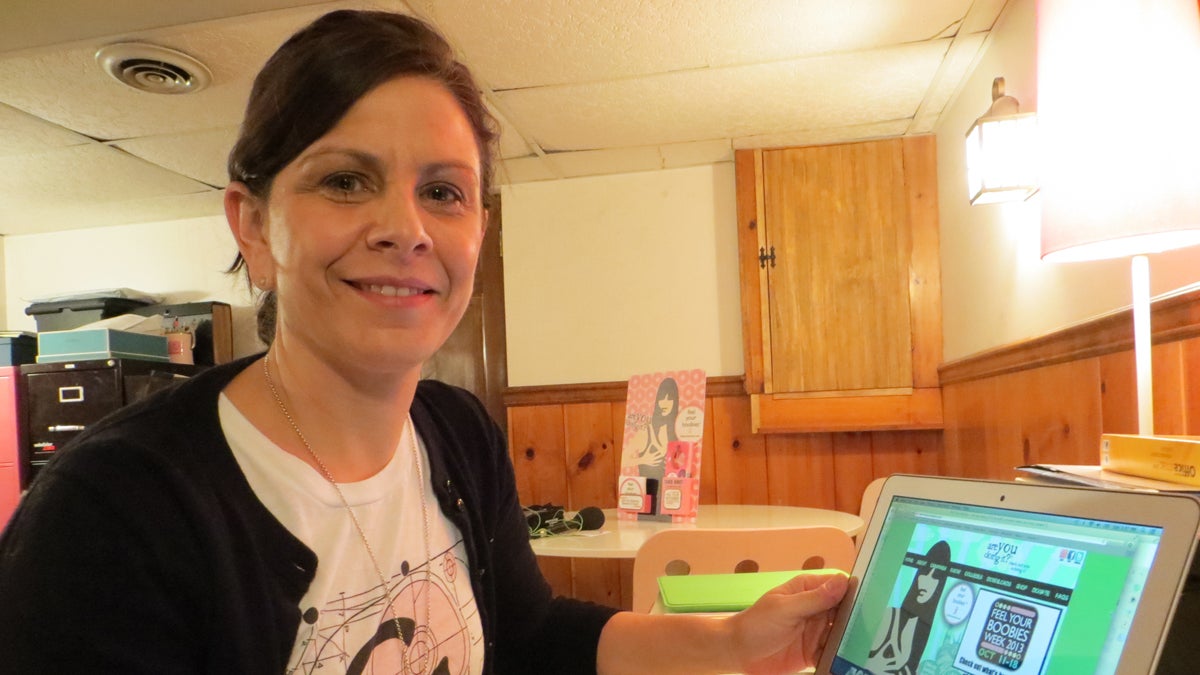Health groups urge breast awareness among women

Leigh Hurst, from Middletown, Pa., leads the nonprofit group Feel Your Boobies. (Taunya English/for The Pulse)
Many women first heard about “breast self-exam” in college. Lots of university student health centers still hand out pamphlets and plaster dorm bathrooms with waterproof information cards.
“We really did cover the landscape with shower cards for many years and encouraged women to do regular breast self-exam,” said Robert Smith, senior director of screening at the American Cancer Society. “Women rarely followed the recommendations exactly,” Smith said.
The idea was to instill a healthy habit—early—so for years medical groups pushed the precise and complicated—some say clunky–maneuvers it takes to do a self breast-exam correctly.
Now, many health groups are easing up a bit.
“There’s not a lot of good data on breast self-examination,” said Kathryn Evers, a radiologist with the Fox Chase Cancer Center.
The result has been wide-ranging advice about self breast exams.
“Breast self-exam is not recommended as a screening tool for breast cancer,” according to the Susan G. Komen Foundation Web site. On the other hand, the Be Aware Foundation’s guidelines say: “Monthly breast self-exam can be life-saving.”
Uncertainty about the effectiveness of self breast-exam has lead many medical groups to focus on “breast awareness” instead. The idea is to make sure women understand what’s normal for them.
“Multiple times a week we see women who are the only one who found their lumps,” said Penn Medicine radiologist Elizabeth Conant.
At age 33, Leigh Hurst was diagnosed with cancer after noticing changes in her breast.
“I felt it over the course of several years,” Hurst said. “Showering, getting dressed, putting my bra on. It was essentially just a hard ridge that felt a little bit more dense and hard along the edge.”
Hurst says she shared her concerns with her doctors for two years before getting a diagnosis.
The Middletown, Pa., resident later founded the nonprofit group Feel Your Boobies to raise awareness about breast cancer among young women.
Hurst’s mission is simple: Get more women to feel comfortable with their breast and understand their cancer risk.
She said simple “breast awareness” can be a lot less intimidating than “a clinical, step-by-step, right and wrong procedure” that is required when you do an “official” self breast-exam.
Feel Your Boobies uses modern images and irreverence in its outreach—including fitted baby T-shirts.
“Let’s not make a T-shirt that you get at a walk or a run that ends up in your pajama drawer that you wear at night,” Hurst said. “Let’s make shirts that you want to wear out at night, to a bar or to a bbq, something social.”
“Women should know what’s normal for them…the important thing is to be attentive and if you notice a change in your breasts to see your doctor right away,” Evers said.
“An individual woman is going to know what’s normal for her more than her doctor is,” said Conant, chief of breast imaging at the Hospital of the University of Pennsylvania. “I tell [women] it’s like oatmeal-cottage cheese but you don’t want to find a grape or a raisin or anything scary in there.”
WHYY is your source for fact-based, in-depth journalism and information. As a nonprofit organization, we rely on financial support from readers like you. Please give today.

